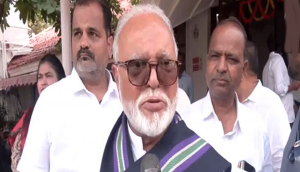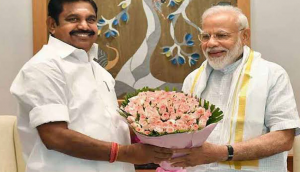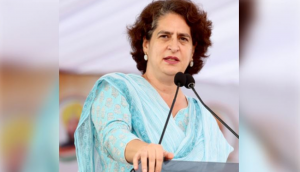Shiv Sena was wrong. But does Sudheendra Kulkarni remember his past?

The present
- Sudheendra Kulkarni made a spectacle of Shiv Sena\'s ink attack on him
- The event organised by Kulkarni was not forcibly stopped, unlike the Ghulam Ali show
The past
- Kulkarni has been the script writer of LK Advani
- Not once did he deride the communal agenda of Advani or Vajpayee
More in the story
- Should we offer unqualified support to Kulkarni today?
- What kind of leaders are we calling apostles of peace?
Black is not a colour of humiliation - This was the message Sudheendra Kulkarni gave when he decided to talk to the media wearing it on his face.
His face was blackened by the ink smeared on his face by Shiv Sainiks registering protest on his body for his audacity to host a meet on a book by a Pakistani politician.
Kulkarni did not hide his face from the camera, took his time to wipe the ink off as we all do in normal times when we or our clothes are soiled or stained. Kulkarni did it well. The protest boomeranged on the outraged Shiv Sena. Now the moment remains inked in the Indian national memory.
No such luck to Taslima Nasreen who was attacked with books and bouquets in Hyderabad by the members of the Muslim Ittahadul Musalmin (MIM). Since then, and even before that, MIM has been known as a party no secular or civilized person should do business with. Even Muslims are advised not to fall in its trap. Rightly so.
A farcical violence
What Shiv Sena did to Kulkarni was violence. It could have been more sinister. Some one mingling with the chosen Sainiks could have attacked Kulkarni with a more dangerous weapon. He could have suffered more grievous injuries.
That it did not happen so does not take away the real and original nature of the protest. It was an act of violence against a private citizen. Unacceptable in a society claiming to function by rule of law.
That the attackers were later felicitated by the supreme leader of Shiv Sena, a party in power in Maharashtra, and its action was deemed "unfortunate" and "avoidable" by the natural national party of India needs to be thought about slightly deeply. They continue in normal businesslike relationship with their partner.
Sudheendra Kulkarni was attacked, but his event went on; no such luck for Ghulam Ali
And that is why the whole episode starts looking like a farce. Shiv Sena decided to lodge an inkish protest against Kulkarni, called him names but the main programme was allowed. Kulkarni moved around with the author against whom the anger was directed, addressed press conferences and posed for photographs.
Days earlier, a similar threat was issued against a concert of ghazal singer Ghulam Ali. It had to be cancelled. Was it because the organizers lacked the courage of Sudheendra Kukarni or was it simply because they were not Sudheendra Kulkarni?
I hate myself for asking this question, but cannot do otherwise. There is something farcical about the whole courageous act.
We don't have to mine our memory deep to recall the same words of praise for those who had participated in the demolition of Babri Masjid, a far more violent act, by the leader of Shiv Sena.
The demolition of Babri Masjid was the result of an open campaign of violence directed not only against the Masjid but the Mulsims of India. It was led by Lal Krishna Advani. Kulkarni was a willing assistant to him.
He had also assisted Atal Bihari Vajpeyee, another charlatan, who justified all acts of violence - be it the burning of Graham Stains and his sons or the Babri demolition or the mass-killing of Muslims in Gujarat by providing contexts for them. Even before that, as Javed Naqvi reminds us, in 1983 he gave the infamous 'river of blood' speech in Assam against Muslim migrants.
Vajpeyee, in civilized societies would have been defending himself in courts of law, fighting criminal charges. Here, we decided to start calling him an "apostle of peace". Advani, junior to him in cunning and more brazen about his project of 'Hindu Rashtra', actively cultivated hatred, nurtured violent leaders and himself unleashed a force that killed thousands and wrecked the lives of many more.
Advani dealt the most severe blow to the secular edifice of India. His greatest sin is that he criminalized Hindu masses and the Indian polity. Kulkarni, known as his speech writer, never ever condemned his masters.
The new avatars
Kulkarni has simply moved on. Like his leaders Vajpeyi and Advani. With a clear heart. They went on to become statesmen of our times. He, a voice of sanity.
We, the ever condemned seculars have been left with no option but to offer him our unqualified support. Reminding him of his past would be bad form.
And yet we need to say that. That existence of the politics of the Shiv Sena and RSS is incongruous with what Sudheendra Kulkarni was trying to do. He has to ask this question: why was his program ultimately held and why the Ghulam Ali concert had to be called off?
Why are we expected to support Sudheendra Kulkarni today? He should be reminded of his past
That is why we need to tell him that his assertion that Mumbai had rejected Shiv Sena is empty rhetoric. Because Mumbai does not ensure security, it is the state government which does it. The security and assurance that Kulkarni had was not available to the organizers of the Ghulam Ali concert.
So, what did Mumbai do there? It, in fact, simply looked on, helplessly, failed by its government.
Let us imagine the unimaginable. A trial for all genocidal crimes in India. Let us think who would be the people in the dock.
Who would be called as accomplices, legitimisers, even if not direct participants? Where would Sudheendra Kulkarni be? What his deposition would be? Pleading innocence?
And yet, despite these questions, we say that whatever Kulkarni did this time was right, what was done to him was violence - an act of crime. And whoever shelters or supports criminals is a criminal.
First published: 19 October 2015, 11:03 IST





![BJP's Kapil Mishra recreates Shankar Mahadevan’s ‘Breathless’ song to highlight Delhi pollution [WATCH] BJP's Kapil Mishra recreates Shankar Mahadevan’s ‘Breathless’ song to highlight Delhi pollution [WATCH]](https://images.catchnews.com/upload/2022/11/03/kapil-mishra_240884_300x172.png)

![Anupam Kher shares pictures of his toned body on 67th birthday [MUST SEE] Anupam Kher shares pictures of his toned body on 67th birthday [MUST SEE]](https://images.catchnews.com/upload/2022/03/07/Anupam_kher_231145_300x172.jpg)






